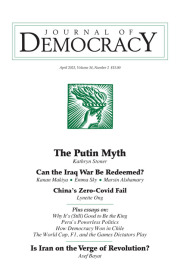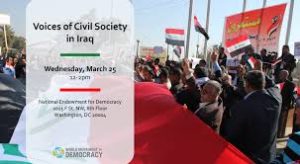 Although Iraq is plagued by corruption, armed actors, and rising poverty and inequality, it’s democratic experiment is not condemned to failure, says Marsin Alshamary, a research fellow at the Harvard Kennedy School’s Middle East Initiative. Iraq has held regular parliamentary elections since 2005 and is a positive outlier in the region. Although it stands at a crossroads between democratization and multiparty authoritarianism, there is cause for hope that its youth and civil society will pave the way for reform.
Although Iraq is plagued by corruption, armed actors, and rising poverty and inequality, it’s democratic experiment is not condemned to failure, says Marsin Alshamary, a research fellow at the Harvard Kennedy School’s Middle East Initiative. Iraq has held regular parliamentary elections since 2005 and is a positive outlier in the region. Although it stands at a crossroads between democratization and multiparty authoritarianism, there is cause for hope that its youth and civil society will pave the way for reform.
Perfecting Iraq’s imperfect democracy will undoubtedly be a gargantuan task, but the country is not without assets, she writes in “Iraq’s Struggle for Democracy,” an article for the Journal of Democracy:
- Foremost among these are its young people. In 2019, a mass protest movement, known locally as the Tishreen Revolution, took Iraq by storm and demanded political, social, and economic change. ….
- In the aftermath of the movement, Iraqi civil society has turned its attention more than ever before toward raising political awareness and democratic literacy. Women’s organizations, in particular, have hosted training workshops that welcome parliamentarians and candidates from traditional parties and newer parties…
- Part of the reason for the subordination of sectarian to other identities may actually be attributable to the security bought by the consociational system. …. most conflict is now happening within rather than between sects, as politicians are forced to vie for control of their own ethnosectarian groups.,,,,
- Finally, one of Iraqi democracy’s most promising assets is Iraq’s oil wealth. This is counterintuitive, as most social scientists have found that oil tends to promote autocracy (in part by giving regimes the wherewithal to cement their coalitions, bribe the population into quiescence, and purchase the implements of coercion). But one reason that Iraq has been able to continue experimenting with democratization for two decades—while the ostensibly more promising experiment in Tunisia collapsed in half that time—is because it can afford to do so, as the fourth-largest economy in the region….RTWT
 Iraq today does not have a “state” in the accepted meaning of the term, since the means of violence are not concentrated in state hands, adds Kanan Makiya.
Iraq today does not have a “state” in the accepted meaning of the term, since the means of violence are not concentrated in state hands, adds Kanan Makiya.
Important decisions are not even made by the top officeholders in the country, but by shadowy power brokers, “bosses” in Mafia terminology, who run what are in effect private armies, largely (but not solely) under Iranian tutelage, he writes for the JOD. The demonstrators demanded “a country,” but to have a country in today’s world one must have a proper state. If Iraq is to avoid the fate of the states in Lebanon and Syria, the emboldened militias will have to be dismantled militarily.
Iraq has had years to build civil society and develop discourse about electoral laws, democracy and freedom of speech, etc., valuable attributes that will remain even if the system takes a bad turn towards multi-party authoritarianism or subnational authoritarianism, Alshamary tells Democracy Paradox. The political consciousness, particularly among young people with high aspirations for democracy will continue to perpetuate these ideas no matter what system of government that they’re living under.
“That gives me a lot of hope,” she adds, “But being realistic, it’s very difficult, if you lose certain assets, it’s very hard to come back and get them later.”
The way to change and democracy in Iraq runs through the youth, says Kanan Makiya. https://t.co/Fq7ZRR1ohz
— Journal of Democracy (@JoDemocracy) May 2, 2023







